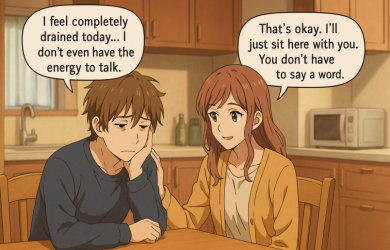The Two Pillars Upon Which Love Stands

Unlock Daily 30-Sec Tips for a Happier Relationship
👉 Subscribe FREEMy philosophy is that the two pillars upon which love stands are Trust and Respect. This is a very important concept. These two things need to be present to grow and maintain love. This means that we have to trust the person we are in a relationship with and we have to respect them, or ultimately we will fall out of love with them.
It was one of my favorite authors, Stephen King, who wrote “Love and lies don’t go together, at least not for long.” Mr. King was absolutely right. The lies will inevitably build up and drain any trust or confidence that we might have had in our mates. Without confidence, love, at least true love, cannot last.
Trusting someone means that when they say, “I am going to do something, ___________ (fill in the blank) ”, they are going to do it. I am going to pick up the kids after school, get a job, make dinner, etc.” When they say they are going to do something, I believe they do it. When I say “A” you get “A,” not “B” or “C.” You will get what I said you would get. Not only does it mean that we trust them and believe that they will do something, there are several other messages embedded in this behavior.
1. It reflects maturity
If your partner is childish then you can’t be sure if they will actually do something or not. Adults actually do what they say they will do. Second, it means that I can take it off my “to do list” and know that it is still going to be done. This is a relief for me. Lastly, it means we can trust “their word.” Now in relationships, being able to trust our partners “word” is huge. If you can’t be trusted, or if you can’t trust your partner to do what they say they will do, then we question everything. We wonder about everything we ask them to do. Will they do it? Will they remember to do it? Will I have to prompt them, or gripe at them to do it? Without the ability to trust our partner, we lose hope.
Hope is important in terms of seeing a brighter future with our partner. Without hope, we lose our sense of optimism that things will be better and that we are in a relationship with an adult, or someone who is capable of being the kind of partner and parent that we need to shoulder the other half of the load. That we are evenly yoked, or that we will only have to do part of the job of raising our children, running a house, paying for bills, etc.
2. It reflects whatever they say is true
Trust implies not only that they will do what they say they will do. It also implies that they can be trusted with what they say. If people lie, or if they stretch the truth or embellish, the same dynamic applies. If our children tell lies 5% of the time, then we question everything. We question the other 95% of the things they say. This takes a lot of energy and eats away at intimacy. Our partners also feel misunderstood and frustrated when they feel that 95% of the time they were telling the truth. But there is an old saying in psychology, “Anxiety comes either from a task we are unprepared for or a future that is uncertain.” It is hard to base a long-term relationship on the uncertainty of things happening or not happening, believing what someone says or not believing them.
3. It reflects responsibility
I think another reason that trust is so important to a relationship is that is serves as the basis for our ability to leave the household at the beginning of a workday. If I trust my mate because they are responsible, I have less fear that they will cheat on me or have sexual relations outside of the relationship. If I can’t trust them in our ordinary world, how am I supposed to be secure in my belief that they won’t have an affair? We have to trust our mates or there will always be a lingering fear in our unconscious that they might be plotting something that will shake my sense of security. We realize that if we can’t trust our mates, we are opening ourselves up to being hurt or having our hearts broken.
Not only is there the issue of not knowing if you can rely on your partner, there is the whole issue of their anger when they feel you don’t believe them (because this time they were telling the truth). Inevitably, this leads to comparisons between their behavior and that of a child’s. I don’t know how many times in therapy I have heard, “it’s like I have three children.” Nothing will anger a man or woman quicker or make them feel more disrespected than being compared to a child.
Trust issues in a relationship
The ability to trust is hard to develop as an adult. Our ability to trust is usually learnt as a child. We learn to trust our mother, father, sisters, and brothers. Then we learn to trust the other kids in the neighborhood, and our first teacher. We learn to trust our bus driver, first boss, first boyfriend or girlfriend. That is the process of how we learn to trust. If we realize that we can’t trust our mom or dad because they are emotionally, physically, or sexually abusing us, we start to question whether we can trust at all. Even if it is not our parents that are abusing us, if they don’t protect us from the person, uncle, grandfather etc. that is abusing us, we develop trust issues. If we have early relationships that involve betrayal or cheating, we develop trust issues. When this happens, we start to wonder if we can trust. Should we trust? Or, as some believe, are we better off being an island; someone who doesn’t have to trust or rely on anyone. Someone who is not beholden to anyone, doesn’t need anything from anyone, can’t be hurt by anyone. It is safer. Not necessarily more satisfying, but safer. Yet, even people with trust issues (or as we refer to them intimacy issues) yearn for a relationship.
Not trusting your partner is holding back love
One of the biggest reasons that trust is such a significant issue in a relationship is that if we don’t trust our partner we start to hold back part of our heart. We become guarded. What I frequently tell my clients is that if we don’t trust our partner we start to hold back either a little bit, a sizable chunk, or a big part of our hearts (10%, 30% or 50% of our hearts). We may not be leaving but we spend parts of our day wondering “How much of my heart should I be holding back”. We ask “what if I put myself in their hands and they betray me?” We start looking at the decisions they are making on a day to day basis, and use those decisions to decide if we should be holding back a great deal of our heart or only a small amount. This means that we hold back access to our inner world, how much we allow ourselves to care for them, to plan on a future with them. We start to prepare ourselves for the possibility that our trust will be betrayed. We don’t want to be blinded and caught unprepared. Because we know at some deep level that if we can’t trust them we are eventually going to be hurt. In order to decrease this sense of impending hurt and in an effort to minimize the pain. We start to hold back our love, our caring for them. Be become guarded. We know that if we open our hearts to them and care for them, trust them, we can be hurt. This is our way of minimizing the hurt. We fear what might be coming. When that day comes we want to be in charge or in control of how much we are hurt. In essence to minimize the chance that we will be devastated. We know we need to be there for our children, to continue to be able to work. We know that if we limit our vulnerability to them, we can only be hurt a little bit (or at least that is what we tell ourselves).
We have more productive energies when we trust completely
We dream however, of a relationship where we don’t have to hold back any of our heart. A relationship where we trust our partner with our best interest, with our hearts. One where we don’t expend energy on looking at their daily attitudes and decisions to decide how little of ourselves we are going to open up, how little of our hearts we will risk. One were we trust them implicitly. One where our energies can go to productive efforts rather than self-protective ones.
Trust is important because if we can trust them to hold true to their words, we can trust them with our hearts. We can trust them with our love. We open up our inner worlds to them and become vulnerable because of this. But if they have shown that they cannot be trustworthy with small things, then we know that we should hold back a commensurate amount of our hearts.
Holding back trust makes your relationship less appealing
Our partners may or may not perceive that we have started to hold back part of our hearts. And just because a person holds back part of their heart it does not necessarily mean that they are planning on leaving their mate. It simply means that a person has some fear that their feelings may be in jeopardy, and that they should preemptively go into self-preservation mode. When we start to hold back a small amount of our hearts, most people start to at least fantasize about leaving their mate and how nice it would be to be with someone they can trust. When greater amounts of our hearts are held back, individuals start to actually make contingency plans just in case they are betrayed. Once again, this does not necessarily mean that they are actually leaving, but they want to be prepared just in case.
If you feel your partner is distant, maybe it is time to ask the question… Do you trust me? Because if the answer is “no”, then maybe you need to talk to a professional about why that is.
 Tips
Tips
Write your tip or submit a video tip
All tips are reviewed before the publishing.
Share this article on
Want to have a happier, healthier marriage?
If you feel disconnected or frustrated about the state of your marriage but want to avoid separation and/or divorce, the marriage.com course meant for married couples is an excellent resource to help you overcome the most challenging aspects of being married.
Related Articles
Recent Articles
Related Quizzes
Unlock Daily 30-Sec Tips for a Happier, Healthier Relationship
👉 Subscribe FREE on YouTube We'd love your feedback!
We'd love your feedback!
 Expert Q&A
Expert Q&A
Ask your question related to this topic & get the support you deserve from experts.



















 Thanks for your feedback!
Thanks for your feedback!